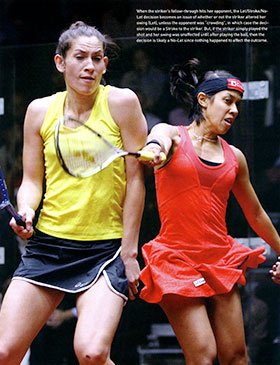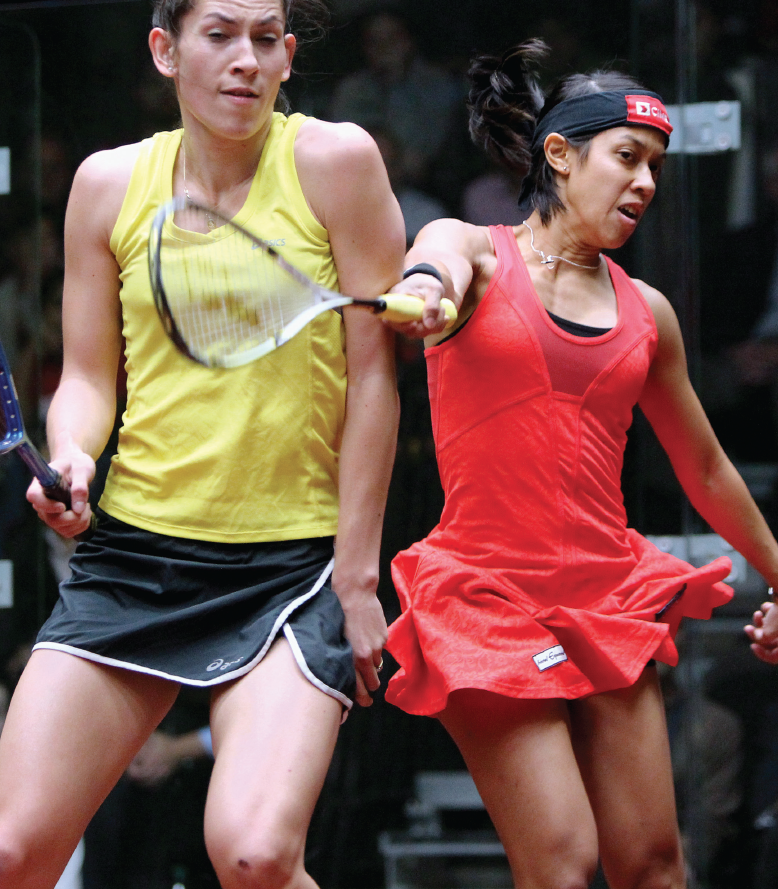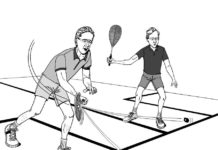
This is the 2nd part of our ‘official’ series of questions—many of which have likely come up for you at one time or other. These are necessarily brief, so if you want further clarifications, check out both the rules and their guidelines for a full picture. There’s a link on the U.S. Squash site.
HEY REF! What happens if I’m scared to death about my opponent’s ‘helicopter’ swing? I have to stand way back so often— and it puts me at a disadvantage.
With two people enclosed in a relatively small space with long rackets attached to long arms flailing madly at a little black ball, things can become dangerous indeed. It’s the Referee’s job, if you have one, to notice unreasonable and dangerous swings and to warn the offender. If it persists, then Conduct Stroke penalties should effect a change pretty quickly. If you are alone, then you have to appeal to your opponent—hoping for common sense to set in. Unless told, sometimes people are oblivious to it. So as a general principle, when in close quarters, the swing should be made as much as possible with the elbow bent (in contrast to locked), and with the racket moving in the vertical plane (in contrast to the horizontal plane). Finally, it’s worth noting that the rules allow for any excessive swing to qualify as interference for the endangered opponent when it’s their turn to play.
HEY REF! What happens if my opponent hit me with the follow-through—but the ball then hit the tin?
This depends on whether your opponent (the striker), modified the swing just before hitting the ball. If say, the striker carried on with striking the ball not realizing that you were there—then of course, nothing happened to affect the outcome. Therefore, even if the striker then appealed, it would be No Let—the clearly fair outcome. But if at the last moment, the striker realized you were close and choked up on the swing with the intent of stopping, then it’s a different story. If you were crowding, then it would be a Stroke to the striker. Otherwise, it’s a Let.
HEY REF! What happens if my opponent messes up the court by throwing up on it?
If it’s big time and cleaning it up would be time consuming, then you win the match. Of course, the Referee has discretion—and if it’s clear that a quick clean up is possible, then as much as possible, the preference is to have the match continue. There are no set times for such occurrences.
HEY REF! What can the Referee do if my opponent (not me, of course!) complains about just about every other decision that doesn’t go in her favor?
A player is entitled to ask for the reason for a decision—but it should be done civilly. Once the reason is given, the player is expected to carry on, whether agreeing or not. Any continuing dissent can be dealt with using the Conduct rule—usually in a progressive manner starting with an informal warning, then to a formal warning, to a Stroke, to a Game—even to a match. The assessment of a couple of Conduct Strokes in a row has a surprisingly calming quality.
HEY REF! What is meant by the expression ‘winning return’ that we occasionally hear about?
It’s quite obvious that it could be applied to a shot that actually won the rally, but it is generally used in relation to an appeal. Most often, the decision about an interference centers around issues such as the ability to return the ball, the effort to clear the ball, the direction of the ball, whether any swing interference was major or minor, and so on. But on occasion, the Referee might determine that, given the level of player in question, any routine shot made at the point of interference would not have been returnable by the opponent. In other words, even if the interference had not occurred, the return would have won the rally. Practically speaking, just about the only place where this applies is when we have a minor swing interference—accompanied by a good clearing effort by the non-striker.
HEY REF! It bugs me when I do my serve, only to find that my opponent is not ready—and now I have to start over. Since the Marker called the score, shouldn’t I get the point?
This is a common problem and indeed often irritating, especially if it happens a couple of times on the same serve—or repeatedly. However, the problem usually lies with the server (that’s you!) who has not checked to see whether the receiver is ready or not. The rules only specify that the server must not serve before the score is called. Having said that, the next version of the rules (due in 2014) will state specifically that the server must not serve ’til the receiver is ready. Of course, any artificial delay to receive (e.g., to catch one’s breath) is unfair, and the Referee should address that with the Conduct rule.





